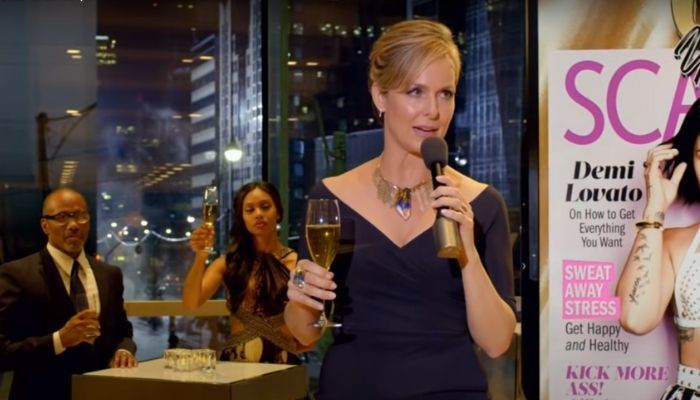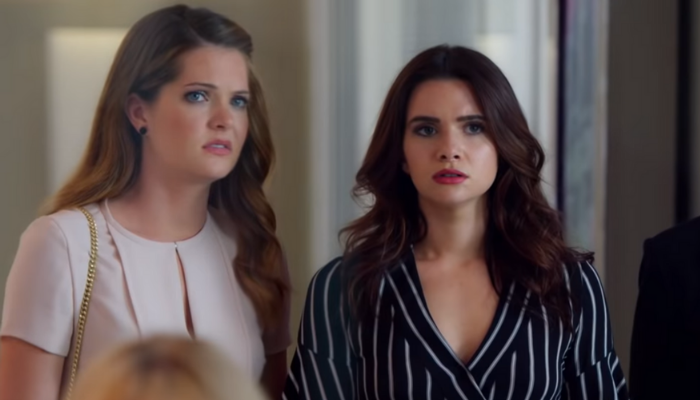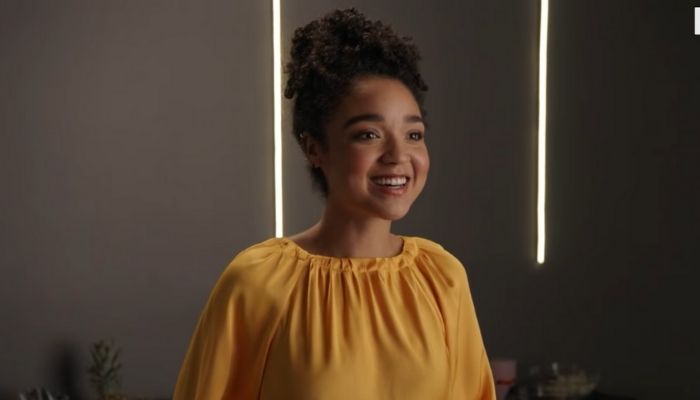Written by: Diya Maria Abraham
The Bold Type, first premiered in 2017 on American channel Freeform, was recently made available on Netflix India. It would be safe to say that the show has become the lockdown binge-watch for many. At first, it feels like you’re watching a combination of Sex and the City and The Devil Wears Prada – lots of glamour, drama, and unrealistic workplace environments. While the show does pander to the needs of a millennial audience, it also tackles a lot of important issues concerning race, gender, intersectionality, and the workplace.
The show can be criticized for being the epitome of white feminism that gives major ‘girl boss’ vibes. It also seems like the three main characters – Kat, Jane and Sutton, have no deadlines and spend more time in the fashion closet or day drinking. This is, to say the least, a whitewashed portrayal of the work culture at media houses.
That said, the show also tackles major political issues like gun control, immigration policy, racism and the #MeToo movement, and more. There are a few things that The Bold Type got right.
In this article, I’ll discuss five good things about the show that we could try and emulate to improve our respective workplaces. Proceed with caution, there may be a few spoilers ahead!
Error 404: Toxic Boss Not Found
USA Today, in their review of the show, described Jacqueline Carlyle as the ‘fairytale editor.’ For those who haven’t watched the show, Jacqueline is the antithesis of the horrible boss trope. From iconic characters like Miranda Priestly to entire film series like Horrible Bosses, the media has shown us that a good boss makes you work till you break. They are often portrayed as arrogant perfectionists with no conception of a work/life balance and whose personal life is in shambles, especially if the boss is female.
Jacqueline Carlyle, the Editor-in-Chief of Scarlet magazine, is a breath of fresh air. She actively tries to create a safe workplace that promotes growth, development and productivity over toxic hustle culture. She stands up for her team, gives space for them to work on their shortcomings, and constantly pushes them to do better at work.

One of her biggest strengths is the empathy she extends to her staff when they’re dealing with crisis in their personal lives, greatly improving their mental health and even channeling it into creating good journalistic pieces.
Research also suggests that good communication and empathy towards employees result in greater productivity and emotional wellbeing. Looks like, we can all take a trick or two out of her leadership handbook!
A Conversation On Privilege
Many of us are ‘woke’ and politically correct on social media but how many of us are able to see past our biases when it affects us personally?
Soon after Jane loses her job at Scarlet, she gets a shot at working for an excellent publication but finds out that even after a stellar interview, she was not considered because the hiring managers were prioritizing on diversity at the workplace.

Jane was disappointed and angry on being turned down for ‘something that was out of her control.’ Here, we see a parallel to the anti-reservation conversations that happen in India. It is common for those higher up in the socio-economic ladder and with caste privilege to argue that those deserving of a position will receive it regardless of their background.
This is where the conversation on privilege on The Bold Type highlights that one is inherently advantageous because of their socio-economic location. Here, Kat delivers a great privilege check – “But how do you know that whoever did get the job wasn’t more perfect? The fact that you assume they only got it because of some diversity handout makes you sound entitled.”
Diversity Done Right?
The conversation as mentioned earlier between Jane and Kat was tense and messy, but it was honest. We must have such interactions at home and at the workplace where the push for diversity and inclusion is taking place gradually. Workplaces in India need to start identifying the dominant demographic of their workforce and their socio-economic locations to see who they might’ve excluded in the history of the company’s existence.
Reservation is essential in granting opportunities to people from different backgrounds and effectively bringing more voices to the table. The chances are high that the workforce will overwhelmingly have people from upper caste and upper-class backgrounds. Such a demographic will need to be equipped with better perspectives on their advantageous position in order to become better allies at work.
On showcasing diversity, the show does a great job. There are many characters from different backgrounds and identities. Kat Edison, the social media manager, is not reduced to a token Black character but is a rather complex biracial woman coming to terms with her sexuality.

The Bold Type also brings to the fore the characters of a lesbian Muslim photographer from Iran, disability representation through Tony award winner Ali Stroker, and a cameo by Sasha Velour, the ninth season winner of RuPaul’s Drag Race.
It is crucial for media portrayal to show staff diversity not only to argue for inclusion but also because they are very much present. Behavioral studies suggest that diverse teams focus more on facts, remain objective, and hold each other accountable, bringing more innovative ideas and increasing collective performance.
New perspectives help not only in reducing biases among employees but also in boosting the company’s intellectual and marketable potential. Turns out diversity and inclusion is not just fair but a smart business strategy as well.
Psychological Safety to Build a Safe Workplace
It is important to question whether the show follows through on the issues it tackles on-screen. Aisha Dee, who plays Kat Edison on the show, recently wrote on Instagram, where she called out the show for not holding up their diversity duties on the set of The Bold Type.
“It took two seasons to get a single BIPOC in the writers’ room for The Bold Type. And even then, the responsibility to speak for the entire Black experience cannot and should not fall on one person. We got to tell a story about a queer Black woman and a lesbian Muslim woman falling in love, but there have never been any queer Black or Muslim writers in the room. In four seasons (48 episodes), we’ve had one Black woman direct two episodes.”
Aisha goes on to talk about the need for marginalized communities to be empowered to tell their own stories. “The level of care, nuance and development that have gone into the stories centering white hetero characters is inconsistent with the stories centering queer and POC characters. We cannot bring specificity and honesty to experiences we have not lived.”
Subverting dominant narratives is possible only when historically marginalized groups are empowered to assert influence over their experiences and matters that concern them. The producers of the show gave a promising statement – “Our goal on The Bold Type is and has always been to tell entertaining, authentic stories that are representative of the world that Kat, Jane and Sutton live in — we can only do that if we listen.”
It’s important to note that employees need to have a certain sense of psychological safety to talk about the issues they face and their opinions on how the workplace can improve. These opinions also need to be well-received on the part of the employers to complete this loop of psychological safety. It’s a two-way street, after all.
An employer that guarantees their workforce psychological safety will do very well on implementing their D&I policies.
‘Out With The Old, In With The New’: Fix Hiring Processes to Build a Safe Workplace
Apart from addressing biases in the hiring processes in corporates, the show also highlights the problematic recruitment process of Scarlet Magazine’s parent company and criticizes its racist and classist roots.
When Kat has to put together a new social media team, she is faced with many dilemmas. Every resume looks similar – Ivy League college, amazing scores, stellar internships and recommendations. She combs through social media to find the perfect person for the role but didn’t complete college to find a fresh voice. Kat has to fight the company’s policy and a boardroom full of old white men in order to hire Angie Flores, a Latino woman.
This move is important for several reasons. Firstly, it recognizes that a fancy college and an impressive resume is not the only aspect that needs to be considered in the recruitment process. Highly skilled candidates that are apt for the job can now be found outside traditional talent clusters as more people are acquiring critical skills on the job and even virtually from their bedrooms.
It’s also important to remember that reputed colleges are open only to a select few of the privileged population – it might be difficult to find new perspectives and talent from places that come from similar backgrounds. Hiring today requires more thought and assessment on what a role needs and who fits it best rather than following a privileged checklist of requirements.
The Bold Type is definitely one of those shows that have the potential to kick-start some important conversations. We love the portrayal of a supportive and safe workplace filled with friendships and fun and would highly recommend to keep this at the top of your binge-watch list.
About the author: Diya is an undergraduate student at St. Stephen’s College. Her interests includes socio-legal research and criminal justice.
Image credit: Freeform/YouTube
Ungender Insights is the product of our learning from advisory work at Ungender. Our team specializes in advising workplaces on workplace diversity and inclusion. Write to us at contact@ungender.in to understand how we can partner with your organization to build a more inclusive workplace.










